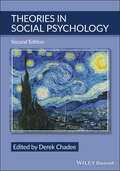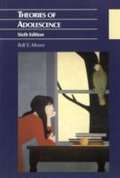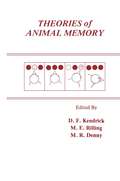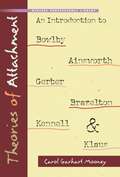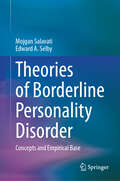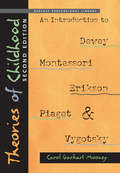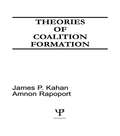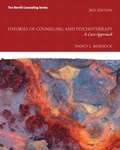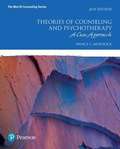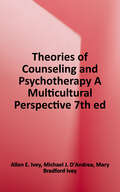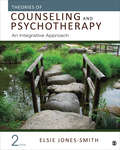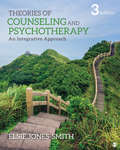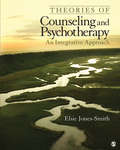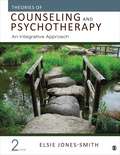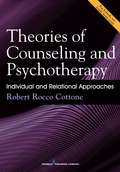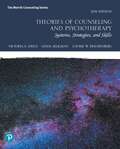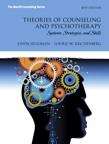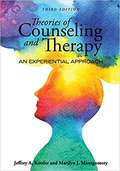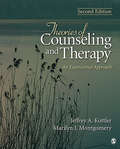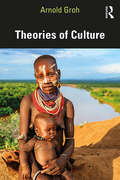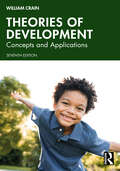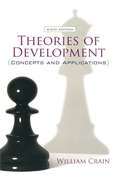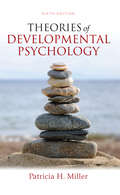- Table View
- List View
Theories in Social Psychology
by Derek ChadeeTHEORIES IN SOCIAL PSYCHOLOGY Theories in Social Psychology develops a deeper, more robust understanding of the theoretical framework underlying the field. Providing rich insights into the central theories and perspectives that continue to shape the discipline, this edited volume brings together a panel of distinguished scholars to address thirteen social psychological theories relating to social cognition, social comparison, social reinforcement, and self. In-depth critical discussions examine topics including cognitive dissonance, reactance, attribution, social comparison, relative deprivation, equity, interdependency, social identity, and more. The expanded second edition fills a substantial gap in current literature by articulating the important psychological theories rather than placing emphasis on applied research. New and revised content helps students understand the construction and complexity of key theories while inspiring researchers of social behavior to reflect on their current work and consider future areas of investigation. This comprehensive resource: Identifies and discusses the theoretical perspectives and specific theories that form the foundation of the study of social psychology Features work from leading scholars including Bertram F. Malle, Paul R. Nail, Richard E. Petty, Thomas Mussweiler, Faye J. Crosby, and Miles Hewstone Helps students move from introductory concepts to multifaceted theoretical frameworks Theories in Social Psychology, Second Edition, remains the perfect textbook for academics and students wanting to study and discuss important social psychological perspectives and theories and attain a deeper understanding of the theoretical framework. “This book will be a very valuable tool for students and professionals alike who wish to learn theories in social psychology and the role they have played in the development of the discipline. It is comprehensive in its coverage and covers the theories in an objective and engaging way.” —Robert J. Sternberg, Professor, Department of Psychology, College of Human Ecology, Cornell University, Honorary Professor of Psychology, University of Heidelberg, Germany “In this wonderful new edition of compilation of theories, at the core of modern social psychology, presented to us by Derek Chadee, we are given a special gift that enriches scholars, teachers and students of psychology in social and general psychology. We are treated to a clear exposition of these theories some of the research and controversy that each has generated, and are given some guidelines to new paths for future exploration of their implications. My research career has benefitted from working in the domains of dissonance, attribution, and social comparison theories, but my teaching and textbook writing has relied on all of the theories and their concepts so elegantly orchestrated here.” —Phillip G. Zimbardo, Ph.D., Professor Emeritus, Stanford University
Theories of Adolescence Sixth Edition
by Rolf E. Muuss Eli Velder Harriet PortonA renowned text, THEORIES OF ADOLESCENCE provides students with a concise, well written, illustrated and readable description of the essence of major theoretical positions (both historical and contemporary) about adolescence and about the phenomena of adolescence and development in general. This one-of-a-kind text focuses solely on the theories of adolescence, giving thorough coverage to all the major theories through 14 topic areas.
Theories of Animal Memory (Comparative Cognition and Neuroscience Series)
by D. F. Kendrick, M. E. Rilling and M. R. DennyFirst published in 1986. Routledge is an imprint of Taylor & Francis, an informa company.
Theories of Attachment
by Carol Garhart MooneyIn this book, early childcare professionals will gain an understanding of the theories of attachment as well as the background and research of the prominent minds behind them. This book explains the core elements of each theorist's work and the ways these elements impact and support interactions with babies, including the topics of bonding, feeding practices, separation anxiety, and stranger anxiety.Carol Garhart Mooney, also the author of the best-selling Theories of Childhood, has worked as a preschool teacher and college instructor of early childhood education for over thirty years.
Theories of Borderline Personality Disorder: Concepts and Empirical Base
by Mojgan Salavati Edward A. SelbyThis book provides a comprehensive review of the major theories underlying the diagnosis of borderline personality disorder. All theories discussed are supported by the latest empirical evidence, and provide the basis for clinicians to develop effective treatments. Acknowledged as a disorder that is particularly difficult to treat, this volume offers a breadth of background on borderline personality disorder that will be highly relevant to academics, researchers and clinicians alike.
Theories of Childhood, Second Edition
by Carol Garhart MooneyExamine the work of five groundbreaking education theorists-John Dewey, Maria Montessori, Erik Erikson, Jean Piaget, and Lev Vygotsky-in relation to early childhood. Theories of Childhood provides a basic introduction to each theorist and explains the relationship of theory to practice and its impact on real children, teachers, and classrooms. This edition reflects current academic learning standards and includes new understandings of Vygotsky's work. It is a popular guide to help early childhood professionals be aware of the theories behind good child care practices. It is also a widely-used text in undergraduate programs, community college courses, and training workshops that focus on early development and education.Carol Garhart Mooney has been an early childhood educator for more than forty years. She is also the author of Theories of Attachment, Use Your Words, and Swinging Pendulums.
Theories of Coalition Formation (Basic Studies in Human Behavior Series)
by James P. Kahan Amnon RapoportFirst published in 1984. In this book, the authors set forth the central ideas and results of the major theories of coalition forming behavior. These theories address situations of partial conflict of interest with the following aspects: (1) there are three or more players, (2) players may openly communicate with each other, and (3) players form coalitions by freely negotiating agreements on how to disburse the gains that result from the coalition members’ joint coordinated efforts. These models arise from the two disciplines of mathematics, in the theory of cooperative n-person games with side payments, and social psychology, in theories of small group behavior in mixed-motive situations. The goal is to explore the various solution concepts that make up this body of theory, and in particular to examine the psychological premises that underlie the various theoretical models.
Theories of Counseling and Psychotherapy: A Case Approach (Third Edition)
by Nancy L. MurdockUsing case studies, applied examples, original source material, and her own inimitable pedagogical style, Nancy Murdock succinctly elucidates fifteen of the most influential and ground-breaking theories of psychotherapy and counseling. With this articulate guide to counseling theory, students will grasp complicated historical theory and not only understand the historical footing and uses of each, but will learn how these theories have informed each other and contributed to modern practice, while applying it to their own professional counseling experience. Examining the historical roots, evaluations, and lasting effects of Existential, Gestalt, Behavior, Cognitive, Reality, Feminist, Family, Narrative, and Solution-Focused Therapy and much more, this text equips students with the history and application necessary to bring theory to life. New Features Include: A New Chapter on Mindfulness Approaches Extensive Coverage of Ethics in Therapy Addition of Outcome and Theory-testing Research for Approaches to Therapy Coverage of Psychotherapy Outcome Research and Evidence-Based Treatment MyCounselingLab connects course content to video- and case-based real world scenarios, and provides: Building Counseling Skills exercises that offer opportunities for students to develop and practice skills critical to their success as professional helpers. Hints and feedback provide scaffolding and reinforce key concepts. Assignments & Activities assess students' understanding of key concepts and skill development. Multiple-Choice Quizzes help students gauge their understanding of important topics and prepare for success on licensure examinations.
Theories of Counseling and Psychotherapy: A Case Approach Fourth Edition
by Nancy L. MurdockUsing case studies, applied examples, original source material, and her own inimitable pedagogical style, Nancy Murdock succinctly elucidates fifteen of the most influential and ground-breaking theories of psychotherapy and counseling. With this articulate guide to counseling theory, students will grasp complicated historical theory and not only understand the historical footing and uses of each, but will learn how these theories have informed each other and contributed to modern practice, while applying it to their own professional counseling experience. Examining the historical roots, evaluations, and lasting effects of Existential, Gestalt, Behavior, Cognitive, Reality, Feminist, Family, Narrative, and Solution-Focused Therapy and much more, this text equips students with the history and application necessary to bring theory to life.
Theories of Counseling and Psychotherapy: A Multicultural Perspective
by Allen E. Ivey Mary Bradford Ivey Michael J. D'AndreaThis book provides future mental health practitioners with a solid foundation in the theoretical concepts of the major theories of counseling and psychotherapy, enabling them to take these theories directly into clinical practice and assist them in examining present-day counseling and therapy from a practical culture-centered perspective while simultaneously respecting traditional individual approaches to the field. The book is unique among other texts in that it fully integrates neuroscience and a multicultural approach, which is demonstrated throughout every chapter and reflects the need for mental health practitioners to have a heightened level of cultural competence and understanding of neuroscience in the future.
Theories of Counseling and Psychotherapy: An Integrative Approach
by Dr Elsie Jones-SmithThis breakthrough edition of Theories of Counseling and Psychotherapy: An Integrative Approach, by Elsie Jones-Smith, sets a new standard in counseling theories books. The Second Edition goes beyond expert coverage of traditional and social constructivist theories with coverage of more contemporary approaches to psychotherapy, including individual chapters on spirituality and psychotherapy, strengths-based therapy, neuroscience and neuropsychotherapy, motivational interviewing, and the expressive arts therapies. In every chapter, the case study of a preadolescent boy demonstrates how each theory can be applied in psychotherapy. Up to date and easy to read, the book engages readers with inner reflection questions that help them apply the theories to the lives of their clients and shows them how to develop their own integrative approach to psychotherapy.
Theories of Counseling and Psychotherapy: An Integrative Approach
by Dr Elsie Jones-SmithThis breakthrough edition of Theories of Counseling and Psychotherapy: An Integrative Approach, by Elsie Jones-Smith, sets a new standard in counseling theories books. The Second Edition goes beyond expert coverage of traditional and social constructivist theories with coverage of more contemporary approaches to psychotherapy, including individual chapters on spirituality and psychotherapy, strengths-based therapy, neuroscience and neuropsychotherapy, motivational interviewing, and the expressive arts therapies. In every chapter, the case study of a preadolescent boy demonstrates how each theory can be applied in psychotherapy. Up to date and easy to read, the book engages readers with inner reflection questions that help them apply the theories to the lives of their clients and shows them how to develop their own integrative approach to psychotherapy.
Theories of Counseling and Psychotherapy: An Integrative Approach
by Dr. Elsie Jones-SmithA step forward from the traditional textbook on counseling theories, Theories of Counseling and Psychotherapy: An Integrative Approach offers readers a comprehensive overview of past and current approaches to psychotherapy and counseling, with a modern approach to theories of psychotherapy. An extensive array of mainstream theories, as well as contemporary approaches such as narrative, feminist, LGBT, and post-modern, are covered. Author Elsie Jones-Smith helps readers to construct their integrated approach to psychotherapy by learning how to develop a broad range of therapeutic expertise to meet the needs of a culturally diverse clientele. In addition to listing and describing theories, this text compares and contrasts them to show their strengths and weaknesses. The Third Edition includes a new chapter on trauma-informed counseling/psychotherapy and provides updated references, sections, and studies reflecting the latest developments within the helping professions.
Theories of Counseling and Psychotherapy: An Integrative Approach
by Dr. Elsie Jones-SmithA step forward from the traditional textbook on counseling theories, Theories of Counseling and Psychotherapy: An Integrative Approach offers readers a comprehensive overview of past and current approaches to psychotherapy and counseling, with a modern approach to theories of psychotherapy. An extensive array of mainstream theories, as well as contemporary approaches such as narrative, feminist, LGBT, and post-modern, are covered. Author Elsie Jones-Smith helps readers to construct their integrated approach to psychotherapy by learning how to develop a broad range of therapeutic expertise to meet the needs of a culturally diverse clientele. In addition to listing and describing theories, this text compares and contrasts them to show their strengths and weaknesses. The Third Edition includes a new chapter on trauma-informed counseling/psychotherapy and provides updated references, sections, and studies reflecting the latest developments within the helping professions.
Theories of Counseling and Psychotherapy: An Integrative Approach
by Elsie Jones-SmithThis text offers an extensive array of theories, including all the mainstream approaches as well as contemporary ones such as narrative, feminist, and post-modern. The author provides an integrative framework that allows students to assess the various theories with respect to possible clinical application. By comparing and contrasting the theories, as well as analyzing strengths and weaknesses of each, students will learn to apply them more flexibly in practice.The book is divided into four major theoretical forces in psychotherapy and introductory sections are provided to help students place a particular theory within a major theoretical period. The four theoretical forces discussed are: (1) psychoanalytical and psychodynamic; (2) behavioral and cognitive school(s); (3) existentialism and humanism; and (4) social constructivism school of psychotherapy. The author discusses social constructivism and then describes at least five theoretical approaches within this theoretical force--solution-focused therapy, narrative therapy, strengths-based therapy, and so on.
Theories of Counseling and Psychotherapy: An Integrative Approach (Second Edition)
by Elsie Jones-SmithThis breakthrough edition of Theories of Counseling and Psychotherapy: An Integrative Approach, by Elsie Jones-Smith, sets a new standard in counseling theories books. The Second Edition goes beyond expert coverage of traditional and social constructivist theories with coverage of more contemporary approaches to psychotherapy, including individual chapters on spirituality and psychotherapy, strengths-based therapy, neuroscience and neuropsychotherapy, motivational interviewing, and the expressive arts therapies. In every chapter, the case study of a preadolescent boy demonstrates how each theory can be applied in psychotherapy. Up to date and easy to read, the book engages readers with inner reflection questions that help them apply the theories to the lives of their clients and shows them how to develop their own integrative approach to psychotherapy.
Theories of Counseling and Psychotherapy: Individual and Relational Approaches
by Robert Rocco CottoneThis book focuses heavily on contemporary approaches and cross-professional applications and emphasizes "big picture" frameworks to conceptualize how major theories of counseling and psychotherapy operate and compare. This innovative new text presents theories using an "paradigm" framework: the organic-medical, psychological, systemic/relational, and social constructivist paradigms. Designed to be accessible and relevant to practice, the book enhances and reinforces learning with the inclusion of learning objectives, chapter summaries, applications of each theory in practice, and brief biographies of major theorists. The text moves beyond traditional approaches with expanded coverage of relationship-centered and post-modern theories such as Dialectic Behavior Therapy, Emotion Focused Therapy, Solution-Focused Brief Therapy, Narrative Therapy, and others. Each theory is explored in depth through the use of a student-mentor dialogue that examines and debates the challenges that arise with each theory. The book also addresses the counseling role in psychiatric case management, reflecting the growing reality of cross-professional collaboration. Practical yet rigorous, the text is a state-of-the-art introduction to contemporary approaches in counseling and psychotherapy for students in counseling, social work, professional psychology, marriage and family therapy, and related professions.
Theories of Counseling and Psychotherapy: Systems, Strategies, and Skills
by Lourie W. Reichenberg Victoria E. Kress Linda W. SeligmanConnect counseling theories with clinical practice. Theories of Counseling and Psychotherapy: Systems, Strategies, and Skills offers an innovative look at emerging and well-established counseling theories. Each theory chapter begins with a brief overview of the approach and a biographical sketch of its developer, and then moves on to the theory’s key concepts, therapeutic process, therapeutic techniques and procedures, application and current use, and strengths and limitations. Particular attention is given to the application of each theory to people from diverse backgrounds. At the end of each chapter, skill development and personal development activities allow students to connect counseling theories to clinical practice. <p><p>Fully revised, the 5th Edition removes the BETA format of previous editions in order to engage with the richness and complexity of each theory. Updated information is provided on each theory, and new chapters have been added to address contemporary cognitive behavioral theories, postmodern theories, and feminist therapy.
Theories of Counseling and Psychotherapy: Systems, Strategies, and Skills (Fourth Edition)
by Linda Seligman Lourie W. ReichenbergTheories of Counseling and Psychotherapy: Systems, Strategies, and Skills offers an innovative look at emerging and well-established counseling theories. Organizing theories into four broad themes (Background, Emotions, Thoughts, and Actions), authors underscore key similarities and differences in each approach. Moving beyond a traditional theories book, chapters include skill development sections that connect counseling theories with clinical practice. Fully revised, this edition brings a stronger multicultural focus, includes over 400 new research references, and offers new activities to sharpen clinical understanding.
Theories of Counseling and Therapy
by Jeffrey Kottler Marilyn MontgomeryThis unique review of therapeutic theories gives students knowledge and skills for clinical practice while presenting key concepts that are immediately and directly applicable to their lives. Thus, Theories of Counseling and Therapy: An Experiential Approach bridges the gap between complex models of counseling and psychotherapy and students’ own personal experiences. Readers are introduced to key ideas and concepts in the discipline and encouraged to apply them in meaningful ways as they learn. <p><p> The text introduces students to theoretical “families,” since many strict boundaries between approaches have softened in recent years. This approach helps students learn the material strategically, as it facilitates the linking of related concepts from different approaches. In addition to studying “classic” theories of counseling and therapy, students are introduced to more contemporary and cutting-edge approaches that take into account a greater diversity of needs among client populations. Additionally, students are provided with illustrative cases, stories, and narratives from beginning practitioners, seasoned experts, and the personalities behind the theories. They will also learn about integrative and pragmatic models that take into account the importance of cultural, worldview, spirituality, and gender sensitivity within the helping professions. <p><p> This thoroughly revised and updated third edition features new applications of theories to populations with particular needs, expanded information on the translation of theoretical knowledge into practice plans and treatment goals, critical thinking exercises, and more. <p><p> Both practical and personal in nature, Theories of Counseling and Therapy is well-suited to courses in counseling and psychotherapy theory. <p><p> Jeffrey A. Kottler is one of the most prominent authors in the fields of counseling, psychotherapy, health, and education, having written over 100 books across a broad range of topics. He is a clinical professor in the Menninger Department of Psychiatry and Behavioral Science at the Baylor College of Medicine in Houston and professor emeritus of counseling at California State University, Fullerton. He has served as a counselor, therapist, supervisor, educator, and social justice advocate in a variety of professional settings throughout his career. <p><p> Marilyn J. Montgomery is a core faculty member at Capella University, where she designs and teaches counselor education courses and provides clinical supervision to masters and doctoral-level students. She has authored and coauthored numerous books, chapters, and professional journal articles on topics related to counseling and human development. She previously served as a principle investigator on a NIAAA-funded grant assessing a theory-based counseling intervention in urban schools. Throughout her career, she has refined her theoretical perspectives by engaging in clinical practice with children, teens, and adults.
Theories of Counseling and Therapy: An Experiential Approach (Second Edition)
by Jeffrey A. Kottler Marilyn J. MontgomeryThrough a unique approach that makes understanding theories in counseling and psychotherapy fun, stimulating, and personally meaningful, this fully updated Second Edition helps students comprehend the various and complex theories, apply the material to their own lives (through the use of the reflective exercises in every chapter) and internalize the content of the course. The book's three-part structure includes an introductory section that provides the background necessary for understanding the theories, a middle section that discusses the main theory "families," and a final section that focuses on synthesis and application. Throughout the text, the authors seek to surprise readers with the best of the past, excite them with the vitality of the present, and prepare them for their futures as therapists.
Theories of Culture
by Arnold GrohThis authoritative but concise guide describes the most significant cultural theories from the 19th to the 21st century and their originators, as well as the links between them and their mutual influences. This guide explores ideas around what culture is, when and why cultures change over time and whether there are any rules or principles behind culture-related phenomena and processes. For those seeking to answer questions on culture, familiarity with these topics is essential. From refugee movements caused by wars, to the ongoing demographical changes in regions of the world like sub-Saharan Africa or the Indian subcontinent, understanding the underlying mechanisms of culture-related processes has become an immediate and essential task. Covering everything from the processes of cultural change to counterculture and destabilisation, the book explains different ideas in a clear and objective fashion and includes approaches that have been unduly neglected but which have high explanatory value regarding culture and its phenomena. Providing readers with an up-to-date idea of what culture is, and how our understanding of it has been established over the past century, this text is the perfect companion for advanced undergraduates, postgraduates and researchers.
Theories of Development: Concepts and Applications
by William CrainTheories of Development introduces students to the most influential theorists who have contributed to our understanding of how we develop as individuals. The book focuses on the theorists who have built upon the developmental tradition established by Rousseau, along with other theorists, including ethologists and psychoanalysts, who share a developmental outlook. It considers the different concepts they present along with their practical implications, whilst also discussing the ways in which developmental theorists have anticipated and advanced humanistic ideas and insights.This edition has been thoroughly updated throughout, and now includes:• A new chapter comparing treatment approaches to autism• Greater attention to Erikson’s theory of identity formation and how it pertains to gender issues• New thoughts on cultural factors in Piaget’s theory• Biographical material on Jane Goodall, Howard Thurman, and Albert Einstein that illustrate developmental processesDemonstrating how we might view the world differently at various stages of life, Theories of Development is a must-read for all students of psychology and education.
Theories of Development: Concepts and Applications (6th Edition)
by William CrainThis text introduces students to twenty-four theorists and compares and contrasts their theories on how we develop as individuals. Emphasizing the theories that build upon the developmental tradition established by Rousseau, this text also covers theories in the environmental/learning tradition.
Theories of Developmental Psychology (Sixth Edition)
by Patricia H. MillerAlways reflective of the latest research and thinking in the field, Patricia Miller’s acclaimed text offers an ideal way to help students understand and distinguish the major theoretical schools of child development. This fully updated new edition includes a new focus on biological theories of development.
